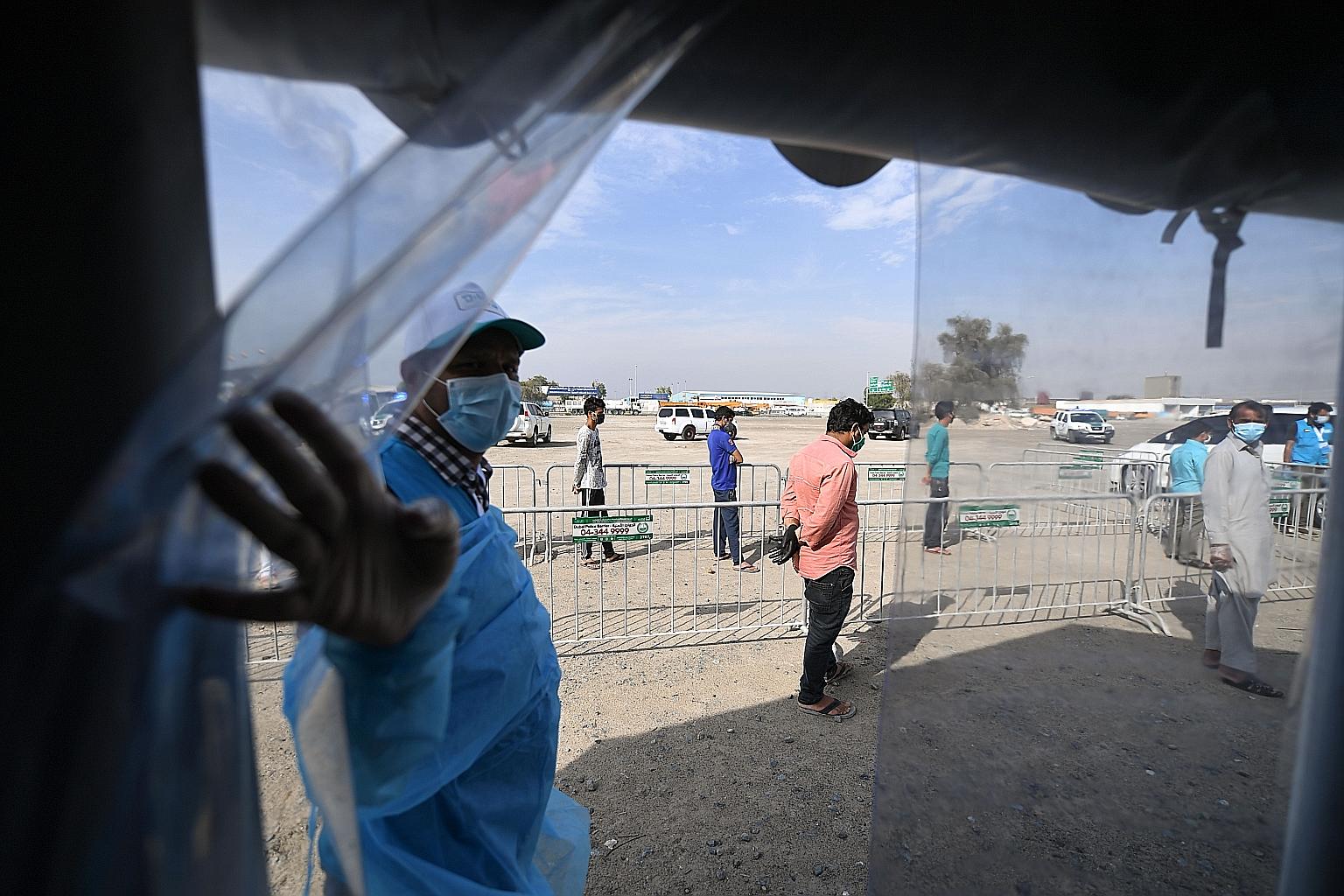Coronavirus pandemic
Migrant workers in Gulf states lose jobs but can't return home
Sign up now: Get ST's newsletters delivered to your inbox

Foreign workers waiting in line to be checked for the coronavirus at a testing centre in Dubai, in the United Arab Emirates, last Saturday.
PHOTO: AGENCE FRANCE-PRESSE
BEIRUT • Qatar has locked down tens of thousands of migrant workers in a crowded neighbourhood, raising fears it will become a coronavirus hotbed.
Companies in Saudi Arabia have told foreign labourers to stay home - then stopped paying them.
In Kuwait, an actress said on TV that migrants should be thrown out "into the desert".
The oil-rich monarchies of the Arabian Gulf have long relied on armies of low-paid migrant workers from Asia, Africa and elsewhere to do the heavy lifting in their economies, and have faced longstanding criticism from human rights groups for treating those labourers badly.
Now, the coronavirus pandemic has made matters worse, as migrants in Gulf States find themselves locked down in cramped, unsanitary dorms, deprived of income and unable to return home because of travel restrictions.
Some are running out of food and money and fear they have no place to turn to, in societies that often treat them like an expendable underclass.
Last month, Mr Totzky de la Cruz, a Filipino restaurant worker in Saudi Arabia, was told to stop work, together with 16 of his colleagues, and that no work meant no pay. The men did not receive their final salary, and the food allowances that their employer promised them have not arrived.
"We are left to help and rely on each other," Mr de la Cruz said. "Whoever has extra money would have to support the others."
The pandemic is also likely to disrupt the significant remittances the migrant workers send home.
Waves of job losses among overseas workers and international border closures are sapping the US$690 billion (S$982 billion) annual flow of global remittances at a time when many emerging economies need hard currency more than ever.
Lebanon, Ukraine and the Philippines will be among the hardest hit, while Latin America could see an 18 per cent drop in money being sent home compared with last year.
The shock from coronavirus "upends the wisdom about remittances being very stable", said Ms Elina Ribakova, deputy chief economist at the Institute of International Finance in Washington. "The countries where migrant workers are temporarily based are experiencing a big crisis, and many of them are in the sectors that are being hit."
The six rich Gulf countries have more than eight million workers from India alone, of whom more than half are blue-collar workers.
The Indian government told the country's Supreme Court last week that it is not prepared to let these workers return home. "The severe risk posed by arrivals from an increasing number of countries affected by Covid-19 is something the government is seeking to minimise," the Ministry of External Affairs told the court.
The total infection count in the six Gulf states themselves has risen steadily to more than 26,600, with some 170 deaths, despite containment measures such as halting passenger flights, curfews and, in several cases, locking down districts with large populations of low-income expatriate workers.
Pakistan, meanwhile, has started repatriating some of its citizens from the United Arab Emirates, which had threatened to review labour ties with countries refusing to take back their nationals during the pandemic. The first Pakistan International Airlines flight carrying 227 "stranded passengers" from Dubai and other emirates left for Islamabad last Saturday evening. More than 40,000 Pakistanis in the Gulf Arab state have registered with the consulate to return home.
Other countries say they, too, are stepping in to help.
Bangladesh Expatriate Welfare and Overseas Employment Minister Imran Ahmed said Dhaka was working to alleviate citizens' hardships, including sending money to foreign missions "so that migrants in trouble can be taken care of".
A Filipino official said citizens overseas can qualify for a government stipend of US$200.
NYTIMES, REUTERS, BLOOMBERG


